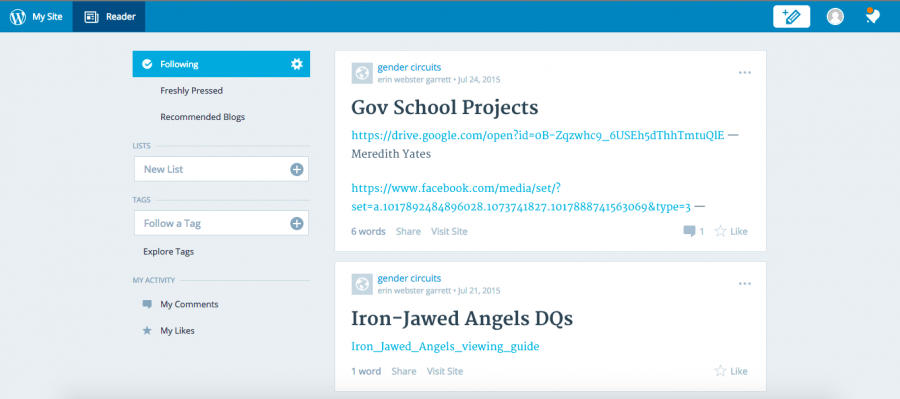The Wonder of WordPress: Blogging is the new venue of expression
Photo courtesy of www.wordpress.org. Blogging has become a new method of expression, and it is possible to keep them either public or private.
August 22, 2015
I never considered myself becoming a blogger.
Keeping a so-called online “journal” seemed too far-fetched from my attachment to paper and pencil, leather-cover diary style that I have been faithfully pursuing since first grade. After all, a blog meant that once I clicked “publish,” the post would be shared with the rest of the world. In certain situations, it would be the easiest way to get one’s ideas across, but it would also carry the risk of revealing personal thoughts.
It was in the summer of 2015, however, when I had the fortuitous chance to change my mind. I was staying at Radford University for a month-long program of Governor’s School for Humanities. The place was very rural, with no Chipotle within five-mile radius and a small farmer’s market organized every Sunday morning.
It was the first time feeling truly disconnected from “society.” And my definition of “society” was truly myopic: it was one in which people constantly worked on their laptops and phones while drinking a cup of Starbucks, metallic buildings and skyscrapers crowded out trees and I did not have to pay for laundry.
It was during one of the lectures at Radford that the professor suggested me to create a blog and record my feelings and reflections of the class for a month. She added that I could keep the blog private, even from herself, and she wouldn’t particularly care.
It was since that day that I started keeping a private blog; it looks perfectly like regular WordPress blog, except that it is only accessible by myself and no one else. Fortunately, recording my everyday life has become a habit, and I think of it as one of those end-of-the-day celebrations.
It is unfortunate to confess that I had difficulties keeping a journal during junior year. The only palpable memories I have of the hectic year were my pencil marks-filled agenda and the worn-out reporter’s notebook with a faded light blue cover, which, except vaguely recognizing the words, “study for physics test,” are not very reflective of my inner thoughts.
One of the reasons why I avoided writing journals was that I, simply, was too tired to record what had happened to my life since 6:30 in the morning when I was already fatigued even thinking about what would happen the next morning. Whenever I looked at the blank pages of my journal staring at me, I felt frightened to put my pencil on the page and start talking about what had happened to my life. Once I started writing, I had to write about everything, without mistakes, until I reached two full pages.
Blogs, on the other hand, were more flexible. I could post anything, and if I wanted to delete a word, I could do it instantly. I didn’t have to cross it out and see the marks being forever staying with me. I could delete an entry and not worry about destroying the entire journal while trying to get rid of it. If I wanted to post a picture, I could do it without printing it out.
Emotions are instant. Once they appear, they appear for a second and disappear instantly. Blogs appreciate such emotions. They provide the convenience to openly express those emotions at the right time, the right moment, without hesitation.
I never knew I would come to enjoy being a blogger. However, as I see the number of archived posts growing, I feel a strange mix of satisfaction and pride. It has become my motivation to continue reporting the sometimes serious, sometimes random outbursts of my thoughts; after all, one second later, they fade into the back of our minds.
Once we push the “publish” button, we keep it forever. I can see it after a month, after a year, or even after five years. And once we have a different perspective, we can simply click “edit.” No inks, no cross-outs, no complaining over how small the diary is to fit all the words in.
Click “update.”






